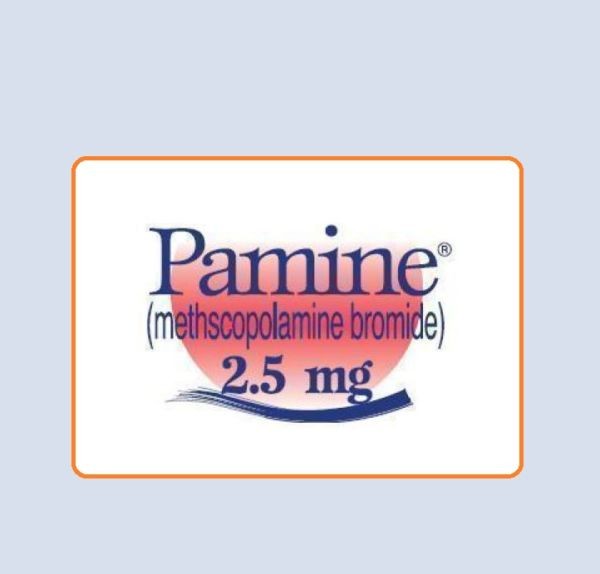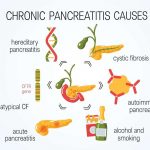
methscopolamine – oral, Pamine, Pamine Forte
Methscopolamine is used with other drugs to treat a certain type of stomach/intestinal ulcer (peptic ulcer). This medication may help relieve stomach/abdominal pain. It has not been shown to be effective in healing these ulcers, preventing their return, or preventing other problems caused by ulcers. Methscopolamine decreases stomach acid, slows gut movements, and relaxes muscles in the stomach/intestines. Methscopolamine belongs to a class of drugs called anticholinergics.
Take this medication by mouth, usually 4 times a day (30 minutes before meals and at bedtime) or as directed by your doctor. Antacids lower the absorption of methscopolamine. Do not take this medication at the same time as antacids. If you are taking an antacid, take it after meals and take methscopolamine before meals. The dosage is based on your medical condition and response to treatment. Do not increase your dose or take this drug more often without your doctor’s approval. Tell your doctor if your condition persists or worsens.
Drowsiness, dizziness, weakness, blurred vision, dry eyes, dry mouth, constipation, or abdominal bloating may occur. If any of these effects persist or worsen, tell your doctor or pharmacist promptly. To relieve dry mouth, suck sugarless hard candy or ice chips, chew sugarless gum, drink water, or use a saliva substitute. To relieve dry eyes, consult your pharmacist for artificial tears or other eye lubricants. To prevent constipation, eat a high-fiber diet, drink plenty of water, and exercise. Consult your pharmacist for help in selecting a laxative. Tell your doctor immediately if any of these unlikely but serious side effects occur: decreased sweating, hot/dry/flushed skin, fast/irregular heartbeat, mental/mood changes, eye pain, vision changes, difficulty urinating, decreased sexual ability. A serious allergic reaction to this drug is rare. Seek immediate medical attention if you notice any symptoms of a serious allergic reaction. This is not a complete list of possible side effects. If you notice other effects not listed above, contact your doctor or pharmacist. Call your doctor for medical advice about side effects.
Before taking methscopolamine, tell your doctor or pharmacist if you are allergic to it or to scopolamine or if you have any other allergies. This product may contain inactive ingredients, which can cause allergic reactions or other problems. Before using this medication, tell your doctor or pharmacist your medical history, especially of glaucoma, enlarged prostate, problems with urination, stomach/intestinal problems, overactive thyroid, heart problems, high blood pressure, heartburn problems, nervous system problems, myasthenia gravis, liver problems, and kidney problems. This drug may make you dizzy or drowsy or cause blurred vision. Do not drive, use machinery, or do any activity that requires alertness or clear vision. Limit alcoholic beverages. This medication may make you sweat less, increasing your risk for heat stroke. Avoid activities that might cause you to overeat or overheat. Seek immediate medical attention if you develop a fever, mental/mood changes, headache, or dizziness. Older adults may be more sensitive to the side effects of this drug, especially drowsiness, confusion, unusual excitement, constipation, and urination problems. During pregnancy, this medication should be used only when clearly needed. It is unknown if this drug passes into breast milk. Consult your doctor before breastfeeding.
See also the How to Use section. The effects of some drugs can change if you take other drugs or herbal products at the same time. To help your doctor and pharmacist give you the best care, be sure to tell them about all the products you use before starting treatment with this product. Many other drugs that also cause dry mouth and constipation may interact with anticholinergics such as methscopolamine. Tell your doctor or pharmacist if you are taking other products that cause drowsiness including alcohol, antihistamines, drugs for sleep or anxiety, muscle relaxants, and narcotic pain relievers. Check the labels on all your medicines because they may contain ingredients that cause drowsiness or a fast heartbeat. Ask your pharmacist about using those products safely. This medication may interfere with certain laboratory tests, possibly causing false test results. Make sure laboratory personnel and all your doctors know you use this drug.
QUESTION
If overdose is suspected, contact a poison control center or emergency room immediately. US residents can call their local poison control center at 1-800-222-1222. Canada residents can call a provincial poison control center. Symptoms of overdose may include: large pupils, hot/dry skin, fever, severe dizziness, severe thirst, difficulty swallowing, mental/mood changes, fast/irregular heartbeat, muscle weakness, inability to move, slowed breathing, fainting, seizures. Do not share this medication with others. Laboratory and/or medical tests should be performed periodically to monitor your progress or check for side effects. If you miss a dose, take it as soon as you remember. If it is near the time of the next dose, skip the missed dose and resume your usual dosing schedule. Store at room temperature away from light and moisture. Keep all medicines away from children and pets. Do not flush medications down the toilet or pour them into a drain. Properly discard this product when it is expired or no longer needed. Consult your pharmacist or local waste disposal company for more details.


